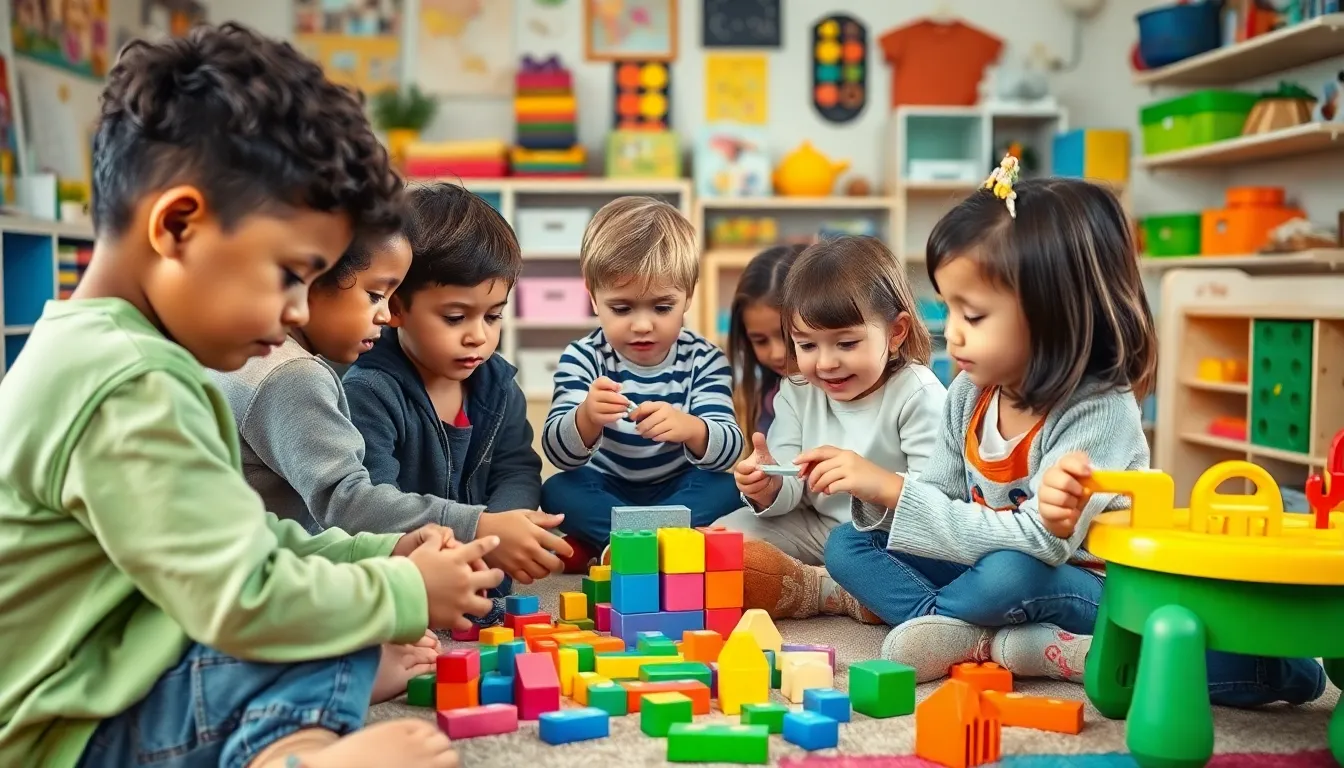Montessori homeschooling offers a unique approach to education that emphasizes child-led learning and hands-on experiences. Rooted in the principles established by Dr. Maria Montessori, this method encourages children to explore their interests at their own pace, fostering independence and critical thinking skills.
In a world where traditional schooling often follows a one-size-fits-all model, many parents are turning to Montessori as a flexible alternative. With its focus on creating a nurturing environment, Montessori homeschooling allows families to tailor their educational journey, making learning both enjoyable and effective. Whether it’s through practical life skills or sensory activities, this approach cultivates a lifelong love of learning in children.
Table of Contents
ToggleOverview of Montessori Homeschooling
Montessori homeschooling focuses on child-led learning and hands-on experiences, inspired by Dr. Maria Montessori’s educational principles. This approach encourages children to explore subjects at their own pace, catering to individual interests and learning styles.
Montessori education emphasizes a prepared environment that nurtures curiosity. The setup includes diverse materials that promote self-discovery and independent thought. Instead of traditional instruction methods, children engage in activities that stimulate critical thinking and problem-solving skills.
In Montessori homeschooling, children develop various skills through practical life activities. These activities include cooking, gardening, and sewing, helping children understand the world around them. Sensory activities, such as exploring textures and scents, enhance their understanding of concepts through direct experience.
This educational model fosters a love of learning, encouraging children to take ownership of their education. Families can adapt the Montessori method to fit their lifestyles, ensuring flexibility in scheduling and material selection. By creating a supportive and responsive learning environment, Montessori homeschooling equips children with the tools needed for lifelong learning.
Principles of Montessori Education

Montessori education emphasizes foundational principles that support holistic child development. Key aspects include child-centered learning, hands-on activities, and mixed-age classrooms.
Child-Centered Learning
Child-centered learning places students at the heart of the educational process. Children choose activities based on personal interests, fostering engagement and autonomy. This approach respects each child’s unique learning trajectory and encourages them to explore concepts that resonate deeply.
Hands-On Activities
Hands-on activities are vital in Montessori education, promoting active learning through tangible experiences. Children participate in tasks like cooking, building, and crafting, directly applying their knowledge. Such activities not only develop practical skills but also enhance cognitive development by integrating sensory experiences into learning.
Mixed-Age Classrooms
Mixed-age classrooms reflect a core principle of Montessori education, creating an environment where peers engage across different ages. This structure allows older students to mentor younger ones, enhancing social skills and fostering community. It encourages collaboration, empathy, and leadership skills while catering to various developmental stages in a single setting.
Benefits of Montessori Homeschooling
Montessori homeschooling offers numerous advantages that enhance children’s educational experiences. It prioritizes individualized learning, fosters independence, and encourages critical thinking.
Individualized Learning Experience
Montessori homeschooling provides a customized learning path for each child. Kids select activities based on their interests and developmental stages, ensuring engagement and relevance. This personalization allows children to progress at their own pace, mastering concepts before moving on. Resources like Montessori materials—such as manipulatives and sensory tools—support various learning styles while reinforcing concepts through hands-on experiences.
Fostering Independence
Independence forms a cornerstone of Montessori philosophy. Kids participate in daily tasks, building practical life skills that foster self-reliance. Preparing their meals, organizing their spaces, or selecting learning activities cultivate confidence and decision-making abilities. This approach empowers children to take ownership of their learning, fostering a sense of accountability that extends beyond academia.
Encouraging Critical Thinking
Montessori homeschooling cultivates critical thinking by promoting inquiry-based learning. Children explore subjects through questions and experiments, encouraging them to think deeply and analyze information critically. By engaging in problem-solving activities and collaborative projects, kids develop analytical skills necessary for success in life. This method instills a genuine curiosity about the world, fostering lifelong learners who seek knowledge and understanding.
Challenges of Montessori Homeschooling
Montessori homeschooling presents unique challenges that can impact the effectiveness of the learning experience. Understanding these challenges equips parents to navigate them successfully.
Need for Parental Involvement
In a Montessori homeschooling environment, consistent parental involvement proves essential. Active participation helps create a nurturing learning atmosphere. Parents must facilitate activities, guide explorations, and ensure a prepared environment. Balancing parental roles can be demanding, especially for working parents or those with multiple children. Support from co-ops or local groups may alleviate some burdens.
Resource Availability
Access to Montessori materials and resources poses another challenge. Quality Montessori supplies often require financial investment, and not all families can afford them. Finding appropriate books, tools, and learning aids can require significant effort. Some families turn to DIY solutions, creating materials using everyday items. Local libraries and community resources may provide alternative options. Online platforms can also offer purchasing solutions and sharing opportunities.
Balancing Structure and Freedom
Maintaining balance between structured learning and child-led exploration remains crucial. Montessori philosophy emphasizes freedom within limits, which can be hard to implement. Families must establish consistent routines while allowing children autonomy in their learning. Striking this balance can prevent feelings of chaos and promote effective learning. Parents may need to experiment with schedules, find effective time blocks, and adjust as needed to support their child’s development.
Montessori homeschooling offers a unique opportunity for children to thrive in a personalized learning environment. By fostering independence and critical thinking through hands-on experiences, it nurtures a love for learning that lasts a lifetime. While challenges exist, such as the need for active parental involvement and resource management, the benefits of tailored education and self-discovery are profound. This approach not only equips children with essential skills but also encourages them to explore their interests at their own pace. Embracing Montessori principles can lead to a fulfilling educational journey that supports holistic development and prepares children for future success.




